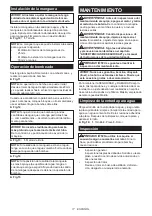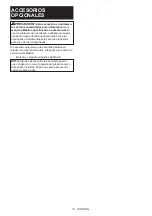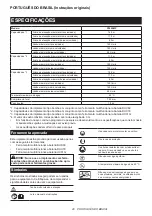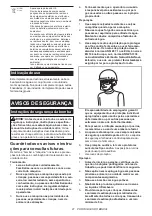
6 ENGLISH
Ni-MH
Li-ion
Only for EU countries
Due to the presence of hazardous com
-
ponents in the equipment, waste electrical
and electronic equipment, accumulators
and batteries may have a negative impact
on the environment and human health.
Do not dispose of electrical and electronic
appliances or batteries with household
waste!
In accordance with the European Directive
on waste electrical and electronic equip
-
ment and on accumulators and batteries
and waste accumulators and batteries,
as well as their adaptation to national law,
waste electrical equipment, batteries and
accumulators should be stored separately
and delivered to a separate collection point
for municipal waste, operating in accor
-
dance with the regulations on environmen
-
tal protection.
This is indicated by the symbol of the
crossed-out wheeled bin placed on the
equipment.
Intended use
This attachment is designed for only the purpose of
pumping water in conjunction with an approved power
unit. Never use the attachment for other purposes.
Abusing the attachment may cause serious injury.
SAFETY WARNINGS
Pump Safety Instructions
WARNING:
Read all safety warnings, instruc
-
tions, illustrations and specifications provided
with this machine as well as the instruction man-
ual of the power unit before using.
Failure to follow
all instructions listed below may result in electric
shock, fire, and/or serious injury to the operator and/
or bystanders.
Save all warnings and instruc
-
tions for future reference.
The term “pump” and “machine” in the warnings and
precautions refer to the combination of the attachment
and the power unit.
Training
1.
Read the instructions carefully. Be familiar
with the controls and the correct use of the
machine.
2.
Never allow children, persons with reduced
physical, sensory or mental capabilities or
lack of experience and knowledge or people
unfamiliar with these instructions to use the
machine. Local regulations may restrict the
age of the operator.
3.
Never operate the machine while people, espe
-
cially children, or pets are nearby.
4.
Keep in mind that the operator or user is
responsible for accidents or hazards occurring
to other people or their property.
Preparation
1.
Always wear substantial footwear and long
trousers while operating the machine.
2.
Do not wear loose clothing or jewellery that
can be drawn into the water inlet. Keep long
hair away from the water inlets.
3.
Always wear protective goggles to protect
your eyes from injury when using power tools.
The goggles must comply with ANSI Z87.1 in
the USA, EN 166 in Europe, or AS/NZS 1336
in Australia/New Zealand. In Australia/New
Zealand, it is legally required to wear a face
shield to protect your face, too.
It is an employer's responsibility to enforce
the use of appropriate safety protective equip
-
ments by the tool operators and by other per
-
sons in the immediate working area.
4.
To prevent dust irritation the wearing of a face
mask is recommended.
5.
While operating the machine, always wear
non-slip and protective footwear.
Non-skid,
closed-toed safety boots and shoes will reduce the
risk of injury.
6.
Wear ear protection, such as ear muffs.
Exposure to noise can cause hearing loss.
7.
Wear protective gloves.
Operation
1.
Before the operation, make sure that there are
no sharp objects in the work area that could
damage the hose.
2.
Do not pour or splash water toward bystand
-
ers, animals, power unit, or energized parts.
3.
Do not use the pump for potable water.
4.
Do not pump corrosive chemicals or flamma
-
ble liquids.
5.
Clear the area of children, bystanders, and
pets. At a minimum, keep all children, bystand
-
ers, and pets outside a 5 m radius.
6.
Switch off the machine and remove the battery
cartridge, and make sure that all moving parts
have come to a complete stop
•
whenever you leave the machine.
•
before clearing blockages.
•
before checking, cleaning or working on
the machine.
•
if the machine starts to vibrate
abnormally.
7.
Operate the machine only in daylight or in
good artificial light.
Summary of Contents for PF400MP
Page 2: ...2 Fig 1 1 2 3 4 5 Fig 2 1 Fig 3 3 2 1 Fig 4 2 1 Fig 5 1 Fig 6...
Page 3: ...3 1 2 3 4 5 Fig 7 1 Fig 8 Fig 12 3 1 2 Fig 9 1 Fig 10 Fig 11 Fig 12 1 Fig 13...
Page 4: ...4 Fig 14 Fig 15 2 1 3 Fig 16 Fig 17 Fig 18...
Page 36: ...36 40 C Ni MH Li ion 1 2 3 4 1 2 3 ANSI Z87 1 EN 166 AS NZS 1336 4 5 6 7 1 2 3 4...
Page 39: ...39 3 7 1 2 3 4 5 4 8 1 9 1 2 3 40 C 10 1 25 mm 33 mm 11 20mm 10 mm 12 13 1 14 15...
Page 40: ...40 Makita Makita 16 1 2 3 Makita 30 N No 2 17 Makita Makita 18 10 30...
Page 41: ...41 Makita Makita Makita Makita Makita...
Page 43: ...43 40 C Ni MH Li ion 1 2 3 4 1 2 3 ANSI Z87 1 EN 166 AS NZS 1336 4 5 6 7 1 2 3...
Page 46: ...46 1 5 1 2 2 6 1 3 7 1 2 3 4 5 4 8 1 9 1 2 3 40 C 10 1 25 mm 33 mm 11 20mm 10 mm 12 13 1 14...
Page 47: ...47 15 Makita Makita 16 1 2 3 Makita 30 Makita N No 2 17 Makita Makita 18 10 30...
Page 48: ...48 Makita Makita Makita Makita Makita...
Page 53: ...53 40 C 10 1 25mm 33mm 11 20mm 10mm 12 13 1 14 15 16 1 2 3 30 N No 2 17...
Page 54: ...54 18 10 30...
Page 77: ...77 40 C Ni MH Li ion 1 2 3 4 1 2...
Page 79: ...79 21 22 23 24 25 26 27 28 29 30 1 1 1 2 Makita 3 4 5 6 7 8 9 10 11 1 2 3...
Page 80: ...80 4 5 6 130 C 7 1 2 3 4 5 6 7 8 1 2 2 1 2 3 4 5 1 2 3 1 2 2 4 1 2 3 2 5 4 5 N m...
Page 81: ...81 1 5 1 2 2 6 1 3 7 1 2 3 4 5 4 8 1 9 1 2 3 40 C 10 1 25 mm 33 mm...
Page 82: ...82 11 20 mm 10 mm 12 13 1 14 15 Makita Makita 16 1 2 3 Makita N No 2 30 17 Makita Makita...
Page 83: ...83 18 10 30 Makita Makita Makita Makita Makita...
Page 84: ...84...
Page 85: ...85 15 3 2 1 16 N No 2 30 17 18 10 30...
Page 90: ...90 3 2 1 16 30 N No 2 Makita 17 Makita Makita 18 10 30 Makita Makita Makita Makita Makita...
Page 95: ...95...







































